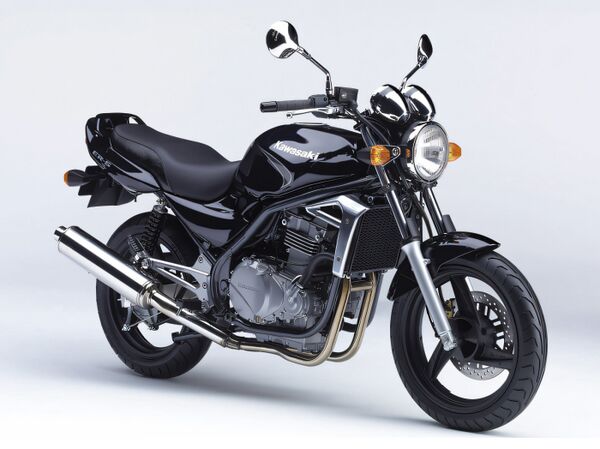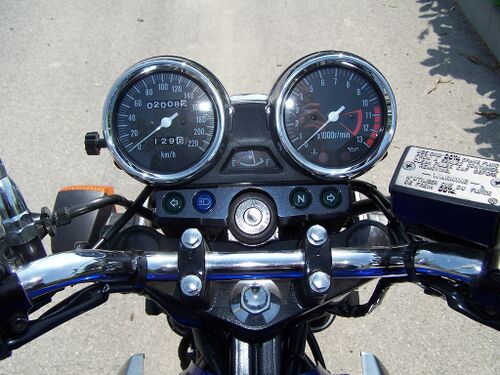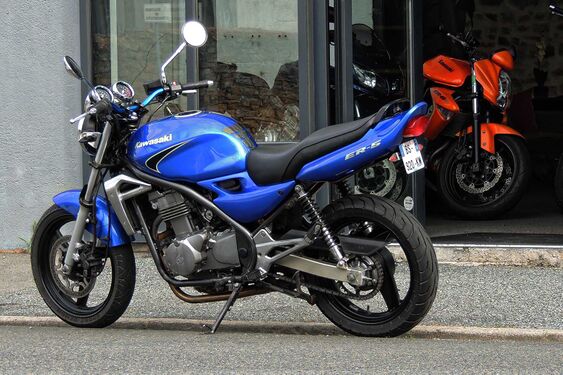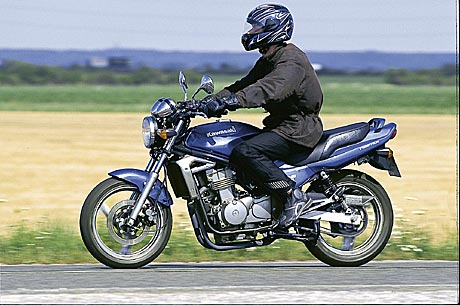Difference between revisions of "Kawasaki ER-5"
m |
m |
||
| Line 1: | Line 1: | ||
{{DISPLAYTITLE: Kawasaki ER-5}} | {{DISPLAYTITLE: Kawasaki ER-5}} | ||
| + | {{#seo: | ||
| + | |keywords={{PAGENAME}}, review, specs, owners manual, service manual, guide | ||
| + | |og:image=https://en.enduro.team/images/8/83/Kawasaki_er-5.jpg | ||
| + | }} | ||
__notoc__ | __notoc__ | ||
[[File: Kawasaki er-5.jpg | center | 600px]] | [[File: Kawasaki er-5.jpg | center | 600px]] | ||
| Line 9: | Line 13: | ||
* [[Kawasaki_ER-5 | Kawasaki ER-5]] | * [[Kawasaki_ER-5 | Kawasaki ER-5]] | ||
* [[Kawasaki_ER-6 | Kawasaki ER-6]] | * [[Kawasaki_ER-6 | Kawasaki ER-6]] | ||
| + | |||
| + | ''' Main competitors ''': | ||
| + | * [[Honda_CB500 | Honda CB 500]] | ||
| + | * [[Honda_CBF500 | Honda CBF 500]] | ||
| + | * [[Suzuki_GS500 | Suzuki GS 500]] | ||
The Kawasaki ER-5 was intended primarily for the European market (the official full name is Kawasaki ER-5 Twister). In 2006, due to the release of new emission standards Euro-3, it is finally phased out and replaced with a more modern flagship motorcycle - [[Kawasaki_ER-6 | Kawasaki ER-6]]. | The Kawasaki ER-5 was intended primarily for the European market (the official full name is Kawasaki ER-5 Twister). In 2006, due to the release of new emission standards Euro-3, it is finally phased out and replaced with a more modern flagship motorcycle - [[Kawasaki_ER-6 | Kawasaki ER-6]]. | ||
The Kawasaki ER-5 features a liquid-cooled, in-line 2-cylinder engine producing 50 hp. power and 45 Nm of torque. The motor had a flat shelf of power and torque, providing confident traction from low to medium revs. In addition to [[Kawasaki_GPZ500 | Kawasaki GPZ500]] and Kawasaki ER-5, this engine was also installed on the enduro tourist [[Kawasaki_KLE500 | Kawasaki KLE 500]] and cruiser [[Kawasaki_EN500_Vulcan | Kawasaki EN500 Vulcan]]. | The Kawasaki ER-5 features a liquid-cooled, in-line 2-cylinder engine producing 50 hp. power and 45 Nm of torque. The motor had a flat shelf of power and torque, providing confident traction from low to medium revs. In addition to [[Kawasaki_GPZ500 | Kawasaki GPZ500]] and Kawasaki ER-5, this engine was also installed on the enduro tourist [[Kawasaki_KLE500 | Kawasaki KLE 500]] and cruiser [[Kawasaki_EN500_Vulcan | Kawasaki EN500 Vulcan]]. | ||
| − | '' | + | ''' Modifications: ''' |
* '''Kawasaki ER-5 (49-50 hp)''' - the standard full-strength version of the motorcycle. | * '''Kawasaki ER-5 (49-50 hp)''' - the standard full-strength version of the motorcycle. | ||
* '''Kawasaki ER-5 (34 hp)''' - "strangled" version of the motorcycle (for the German market). | * '''Kawasaki ER-5 (34 hp)''' - "strangled" version of the motorcycle (for the German market). | ||
The bike also had a cheap steel frame, a classic double shock at the rear, and rear drum brakes, which, even at the time of production, was a rather archaic decision. Meanwhile, the main advantages of the Kawasaki ER-5 are low cost, engine efficiency and simplicity. It is these qualities that made the Kawasaki ER-5 a fairly popular model in Europe. | The bike also had a cheap steel frame, a classic double shock at the rear, and rear drum brakes, which, even at the time of production, was a rather archaic decision. Meanwhile, the main advantages of the Kawasaki ER-5 are low cost, engine efficiency and simplicity. It is these qualities that made the Kawasaki ER-5 a fairly popular model in Europe. | ||
| − | |||
| − | |||
| − | |||
| − | |||
| − | |||
== Photos == | == Photos == | ||
Latest revision as of 17:29, 26 June 2023
The Kawasaki ER-5 first appeared in 1997 and lasted until 2005. This motorcycle was based on the sports 2-cylinder engine from Kawasaki GPZ500, which received different camshafts, a lower degree compression, other exhaust system and other carburetor settings.
Lineup :
Main competitors :
The Kawasaki ER-5 was intended primarily for the European market (the official full name is Kawasaki ER-5 Twister). In 2006, due to the release of new emission standards Euro-3, it is finally phased out and replaced with a more modern flagship motorcycle - Kawasaki ER-6. The Kawasaki ER-5 features a liquid-cooled, in-line 2-cylinder engine producing 50 hp. power and 45 Nm of torque. The motor had a flat shelf of power and torque, providing confident traction from low to medium revs. In addition to Kawasaki GPZ500 and Kawasaki ER-5, this engine was also installed on the enduro tourist Kawasaki KLE 500 and cruiser Kawasaki EN500 Vulcan.
Modifications:
- Kawasaki ER-5 (49-50 hp) - the standard full-strength version of the motorcycle.
- Kawasaki ER-5 (34 hp) - "strangled" version of the motorcycle (for the German market).
The bike also had a cheap steel frame, a classic double shock at the rear, and rear drum brakes, which, even at the time of production, was a rather archaic decision. Meanwhile, the main advantages of the Kawasaki ER-5 are low cost, engine efficiency and simplicity. It is these qualities that made the Kawasaki ER-5 a fairly popular model in Europe.
Photos
Specifications
Specifications Kawasaki ER-5:
| Model | Kawasaki ER-5 |
|---|---|
| Motorcycle type | road (classic) |
| Release year | 1997-2005 |
| Frame | steel, type "double cradle" |
| Engine type | 2-cylinder, 4-stroke, in-line |
| Working volume | 498 cc cm. |
| Bore / Stroke | 74.0mm x 58.0mm |
| Compression ratio | 9.8: 1 |
| Cooling | liquid |
| Number of valves per cylinder | DOHC, 4 valves per cylinder |
| Fuel supply system | Carburetor, 2x Keihin CVK34 |
| Ignition type | transistor |
| Maximum power | 50.3 h.p. at 9000 rpm (since 2003 - 49 HP at 8700 rpm) |
| Maximum torque | 45.0 Nm @ 7200 rpm (since 2003 - 43 Nm @ 7200 rpm) |
| Gearbox | 6-speed |
| Drive type | chain |
| Front tire size | 110 / 70-17 54H |
| Rear tire size | 130 / 70-17 62H |
| Front brakes | 1 disc 280 mm, 2-piston caliper |
| Rear brakes | drum, 160 mm |
| Front suspension | 37mm telescopic fork, 125mm travel |
| Rear suspension | linkage with two shock absorbers (5-stage preload adjustment), stroke - 105 mm (since 2001 - 114 mm) |
| Dimensions (LxWxH) | 2040 (from 2001 - 2070) x 730 x 1070 mm |
| Wheelbase | 1430 mm |
| Saddle height | 800 mm (up to 2001 - 780 mm) |
| Acceleration to 100 km / h | 6 sec |
| Maximum speed | 180 km / h |
| Fuel tank capacity | 17 l (up to 2001 - 16 l) |
| Motorcycle weight (dry) | 174 kg - ER-5 (1997-2000)
179 kg - ER-5 (2001-2005) |
| Motorcycle weight (curb) | 193 kg - ER-5 (1997-2000)
199 kg - ER-5 (2001-2005) |
Documentation



